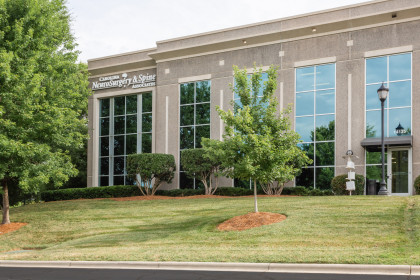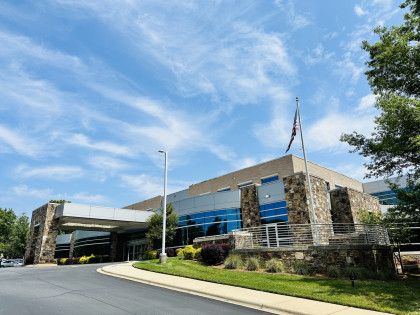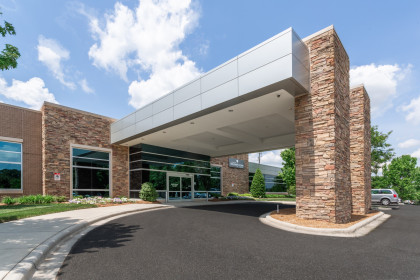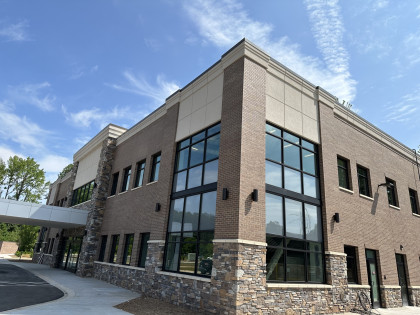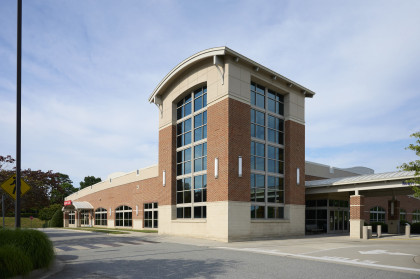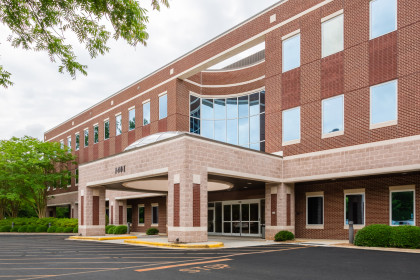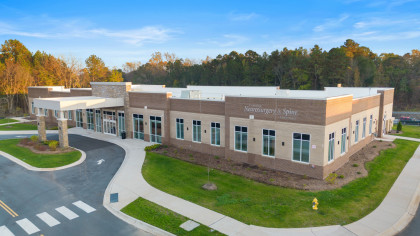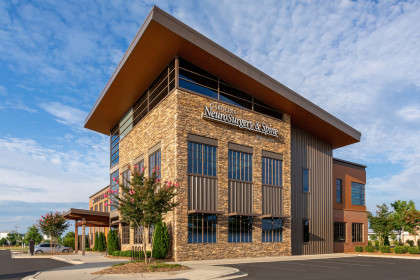Brain Tumor Treatment
Your Guide to Compassionate Brain Tumor Care
The physicians of Carolina Neurosurgery & Spine Associates fully understand the physical and medical implications of a brain tumor diagnosis. As human beings, they also realize the emotional toll a brain tumor diagnosis can have on a patient and his or her family. That's why Carolina Neurosurgery & Spine Associates is proud to offer comprehensive brain tumor treatment and care, from advanced surgical procedures to patient support and counseling.
What is a Brain Tumor?
A brain tumor is an abnormal growth of cells in the brain or central nervous system. Unlike normal cells, these cells grow uncontrollably, forming a mass that can either be benign (non-cancerous) or malignant (cancerous).
Benign tumors generally grow slowly and may not cause symptoms for a long time, while malignant tumors are more aggressive and can spread to other parts of the body.
Tumors can arise from different types of tissues within the brain, such as neurons, glial cells, or meninges, leading to a variety of brain tumor types, each with its own set of characteristics and treatment options.
Understanding the type and nature of a brain tumor is crucial for determining the most effective treatment strategy.
What Causes a Brain Tumor?
The exact cause of most brain tumors remains unclear, making them a subject of extensive research. However, some factors have been identified that may increase the risk of developing a brain tumor.
These include genetic predispositions, exposure to certain chemicals or radiation, and a history of other types of cancer. It's important to note that having one or more of these risk factors does not guarantee that a person will develop a brain tumor; likewise, some individuals develop brain tumors without any known risk factors.
What are Three Symptoms of a Brain Tumor?
The symptoms of a brain tumor can vary greatly depending on the tumor's size, location, and rate of growth. However, three common symptoms frequently observed are headaches that worsen over time, seizures, and vision changes.
Other symptoms that might be experienced include:
- Cognitive changes, such as difficulty with memory or reasoning
- Speech difficulties
- Numbness or tingling in the limbs
- Loss of balance
- Changes in personality
- Nausea or vomiting
It's important to remember that these symptoms can also be caused by conditions other than a brain tumor. Therefore, if you're experiencing one or more of these symptoms, it's crucial to consult a healthcare professional for an accurate diagnosis and appropriate treatment options.
What are the First Warning Signs of a Brain Tumor?
The first warning signs of a brain tumor can be subtle and easily mistaken for more common, less serious conditions. Nonetheless, persistent headaches that worsen in intensity and frequency over time are often one of the earliest indicators.
Additionally, unexplained seizures or sudden episodes of confusion can also serve as initial warning signs. Changes in vision, such as blurriness, double vision, or loss of peripheral vision, are other symptoms that may appear early on.
Because these symptoms can be indicative of a variety of medical issues, not just brain tumors, it's essential to consult a healthcare provider for a comprehensive evaluation if you experience any of these warning signs.
How Do You Know If You Have a Brain Tumor?
Determining if you have a brain tumor involves a multi-step diagnostic process that generally begins with a thorough medical evaluation. If you're experiencing symptoms such as persistent headaches, seizures, or vision changes, your healthcare provider may initially recommend imaging tests like MRI or CT scans to examine the brain's structure.
Blood tests and neurological examinations may also be conducted to evaluate your overall health and neurological function. In some cases, a biopsy may be necessary to confirm the presence and type of tumor.
Early detection and specialized care are key factors in effectively managing a brain tumor and optimizing your quality of life.
Why Choose CNSA for Brain Tumor Treatment?
Carolina Neurosurgery & Spine Associates provides specialized medical care for patients with primary benign tumors, malignant tumors, or brain metastasis from another part of the body.
Most importantly, the physicians and staff of Carolina Neurosurgery & Spine Associates are here every step of the way to give brain tumor patients a clear direction, and a clear advantage.
For both Charlotte-area and Greensboro patients, our surgeons provide brain tumor care out of most of our hospital partner locations. Find the complete list of our hospital partners on our About Us web page.
The majority of Charlotte-area brain tumor treatments are conducted through the Atrium Health Neurosciences Institute and the Atrium Health Levine Cancer Institute at Atrium Health Carolina's Medical Center.
State-of-the-Art Brain Tumor Treatment
Full electro-diagnostic services complement the brain tumor effort by providing intra-operative brain mapping, intra-operative EEG, SSEPs, BAERs, etc. when appropriate. Atrium Health offers a dedicated radio surgical device, the Brain Lab Novalis, that makes it possible to provide state–of–the–art, minimally invasive treatments for patients with a variety of brain tumors.
Coordinated Brain Tumor Treatment and Care
Our neurosurgeons work closely with each patient's referring physician and consult with a multidisciplinary team of specialists to evaluate each case and determine the most appropriate course of treatment. Patients receive care based upon input from professionals in the fields of:
- Neurosurgery
- Neuro-Radiology
- Neuro-Oncology
- Radiation Therapy
- Neuropsychology
- Physical & Rehabilitative Medicine
- Medical Social Work
Hospital-based clinical brain tumor teams, which include nurse clinicians at area hospitals, coordinate in-house treatment of brain tumor patients and assist with necessary patient follow-up care. In addition to their unique clinical expertise, the members of these teams are acutely sensitive to the needs of brain tumor patients and their families.
How Long Before Brain Tumor Symptoms Show?
The timeline for the onset of brain tumor symptoms can vary significantly depending on the type, location, and size of the tumor. Some tumors are slow-growing and may take years to produce noticeable symptoms, while others are more aggressive and can cause symptoms to appear relatively quickly.
Additionally, smaller tumors may not cause symptoms until they grow large enough to exert pressure on surrounding brain tissue or impede normal brain function.
In some cases, symptoms may only become apparent during advanced stages of the tumor's development, making early detection challenging.
What are 3 Types of Brain Tumors?
Understanding the types of brain tumors can be crucial for effective diagnosis and treatment planning. The most common types of brain tumors are:
- Gliomas: These originate in the glial cells and are the most common type of brain tumor. Gliomas can be further classified into astrocytomas, oligodendrogliomas, and ependymomas
- Meningiomas: Arising from the membranes surrounding the brain and spinal cord, meningiomas are usually benign but can still cause significant issues due to their location
- Pituitary Tumors: These tumors develop in the pituitary gland and can affect the body's hormonal balance. Though generally benign, they can still cause a variety of symptoms
Other types of brain tumors include:
- Acoustic neuromas
- Medulloblastomas
- Pineal gland tumors
- Craniopharyngiomas
- Hemangioblastomas
Each type of brain tumor has its own set of characteristics, potential symptoms, and treatment options.
Can a Brain Tumor Be Cured Completely?
The possibility of completely curing a brain tumor depends on various factors such as the type, size, location, and stage of the tumor, as well as the patient's overall health. While some benign tumors can often be completely removed through surgical intervention, malignant tumors pose a more complex challenge and may require additional treatments like radiation and chemotherapy.
Even after successful treatment, there is a risk of recurrence for both benign and malignant tumors. Advanced medical technologies and treatment modalities are continually improving the prospects for patients with brain tumors, but it's crucial to have a multidisciplinary healthcare team to develop the most effective treatment plan tailored for each individual.
What is the Best Treatment for a Brain Tumor?
Determining the best treatment for a brain tumor is a multifaceted process that depends on numerous factors such as the tumor's type, location, size, and stage, as well as the patient's age and overall health.
Treatment options can range from surgical removal, radiation therapy, and chemotherapy to newer methods like targeted therapy and immunotherapy. In many cases, a combination of these treatments may be recommended for optimal results.
At Carolina Neurosurgery & Spine Associates, our multidisciplinary team of specialists collaborates to create a tailored treatment plan for each patient, incorporating the latest advancements in medical technology and research.
It is crucial to consult with a healthcare team to understand all available options and decide on the most effective treatment plan for your specific case.
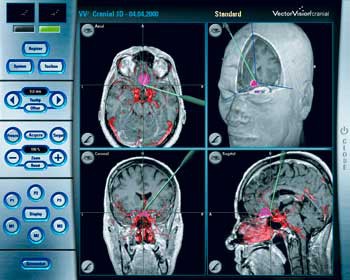
Stereotactic Radiosurgery
This innovative technology allows our stereotactic team to treat localized lesions previously considered inoperable. Primarily, malignant tumors and benign lesions can be successfully treated with stereotactic radiosurgery, which is generally an outpatient procedure.
Through the use of CT scans, angiography, MRI, specialized radiation delivery systems, and three-dimensional computer modeling, areas of abnormal tissue can be precisely mapped and treated by finely defined radiation beams. This treatment allows patients to potentially avoid further invasive procedures.
State-Of-The-Art Radiosurgery Device
The Brain Lab Novalis Radiosurgery System is a state-of-the-art radiosurgery device that allows us to grow our radiosurgery program while expanding treatment options for patients with CNS malignancies.
Utilizing the latest technology, surgical instruments are continuously visualized relative to pre-operative diagnostic images, giving surgeons the ability to see beyond the surface of the surgical field using computer renderings and plan the incision with greater accuracy.
Brain Tumor Phase I, II and III Clinical Trials
Our practice is actively engaged in the international effort to advance brain tumor therapies, by participating in Phase I, II, and III clinical trials. Additionally, the practice is heavily involved in outcomes research. For more information, or to refer a patient, click here or call Carolina Neurosurgery & Spine Associates at 800-344-6716 (Charlotte area) or 336-272-4578 (Greensboro area).


